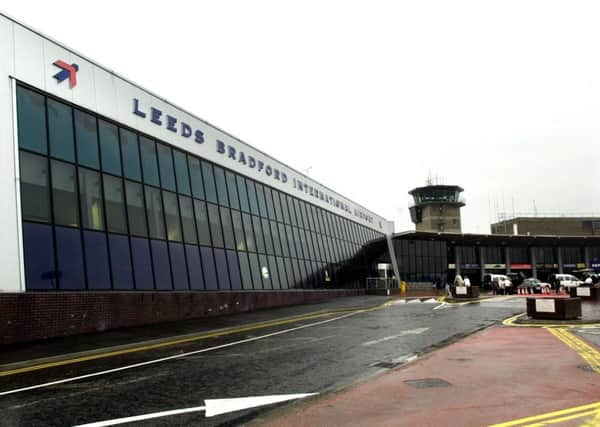Airport turbulence puts spotlight on our infrastructure


Wakefield Council leader Peter Box has called for a broader debate on the future of transport in the North including alternative proposals for high speed rail, investment in the road network and a possible long-term replacement for the airport.
Questions are now being asked about whether it makes better economic sense to invest money in improved transport links to the existing airport which may have limited scope for growth or consider the more radical option of a new airport on a site better connected to major roads and rail lines and with room to expand over the longer term.
Advertisement
Hide AdAdvertisement
Hide AdThe news will not have gone down well in Yeadon, where the international airport is located.
According to annual accounts published earlier this month, Leeds Bradford International Airport Ltd is currently exploring with its majority shareholder and potential funders options to refinance the group on a medium-term basis.
Bridgepoint Capital, the private equity firm, bought the airport from a consortium of five local authorities for £145m in 2007, a year now regarded as the top of the market for buyouts.
The company’s stated intention is to put a new financing structure in place before May 2.
Advertisement
Hide AdAdvertisement
Hide AdIn the annual report, the directors said they are aware that the ability to refinance represents “a material uncertainty that casts significant doubt upon the group’s ability to continue as a going concern”. The uncertainty is linked to the obligation to repay the senior facilities on May 2.
At the year ending March 2013, these comprised a senior term loan of £49.2m, a capital expenditure facility of £20.6m and the airport’s terminal development facility of £11.3m.
The directors said they have a reasonable expectation that the group has the ability to refinance its senior debt and redeemable preference shares by May 2.
They said the company will have sufficient liquidity and capital resources to meet its obligations in the normal course of business for the foreseeable future.
Advertisement
Hide AdAdvertisement
Hide AdThe asset is performing well: turnover for the year was up 11 per cent to £25m.
This was driven by increases in both aeronautical and commercial revenues, following the introduction of new services including British Airways and Monarch and improvements to the airport’s retail offering, not least the extended Yorkshire Premier Lounge.
The company reported earnings before tax, interest, debt and amortisation of £3.67m, down from £3.88m the previous year.
It reported a pre-tax loss of £8.61m, worse than the £8.07m the previous year.
Advertisement
Hide AdAdvertisement
Hide AdA spokeswoman for the airport yesterday said that the airport is “on schedule” with the refinancing.
I wonder how potential funders will view comments from our political leaders.
Take this as an example from Keith Wakefield, the leader of Leeds City Council, speaking to the Yorkshire Post last Wednesday.
“We want Leeds and Yorkshire to be as ambitious as any other region. The existing operators of Leeds-Bradford have been very good and increased passenger numbers but if we are to make sure aviation is a key part of our transport strategy we have to recognise there are limitations on the existing location.
Advertisement
Hide AdAdvertisement
Hide Ad“If we are looking 20, 30, 40 years ahead there might be a better location so it can link with HS2 and create a transport hub.”
Tony Hallwood, the airport’s commercial director, said Leeds Bradford can meet the long-term need for air travel in Yorkshire and can continue to grow at a fast pace, whereas a new airport could be decades away and would likely cost billions.
Funders do not like uncertainty because it increases risk. With increased risk comes an increase in the cost of borrowing. In turn, this makes it harder for indebted companies to invest for growth. And so on.
Nevertheless, Yorkshire’s politicians should be looking at the region’s aviation needs in the future. The region’s lack of direct connectivity to the growth markets should be a cause for concern, both for exporters and foreign direct investment.
But politicians should be mindful of the effects that their words might be having on investor sentiment here and now.